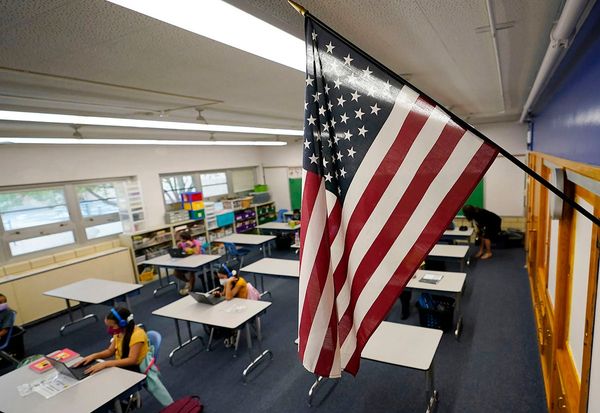WASHINGTON _ House Democratic candidates are raising money like never before in the run-up to Election Day _ and their record-setting hauls are alarming already anxious Republicans who now worry that a difficult political environment is becoming even worse.
In Kentucky, for instance, Democrat Amy McGrath announced this week that she had collected $3.65 million from July through September. Sharice Davids, running in suburban Kansas City, said she had raked in $2.7 million during the quarter. And in California, Josh Harder delivered $3.5 million. Others across the country are repeatedly posting hauls of well more than $1 million.
The sums _ driven by small-dollar online fundraising _ are unprecedented, sometimes exceeding even what many House candidates typically raise during an entire campaign. And strategists in both parties say they see this cash surge as a major inflection point in the campaign.
"When we look back, that may very well be the big enthusiasm advantage that we think may have been decisive," said California-based GOP strategist Rob Stutzman, who added that as of now, he expects "the odds are that Republicans lose 30-40 seats."
Said Democratic strategist Ian Russell, "The Republicans have walked into an ambush by a well-armed force."
News of the fundraising totals comes as Republicans are already braced for a rough national environment. Trump remains polarizing, adored by his base but appalling to many moderate suburbanites, who are putting dozens of traditionally Republican districts into play this cycle. Making matters worse, the party has also been beset by retirements from key incumbents in once-safe GOP seats. And incumbent Republicans who are running this cycle continue to get outraised, despite two years' worth of warnings to avoid that from national GOP leaders.
Now armed with an influx of campaign cash, Democrats have the resources to push even further into longtime Republican territory.
Democrats "are running in a better environment than in the last several cycles, and they have a lot of money," said former Ohio GOP Chairman Matt Borges. "I think you'll see some of that translate into Democrats taking some of these districts, some of these offices around the country that they otherwise wouldn't have, shouldn't have been able to."
Republicans like Borges stress that money alone doesn't deliver victories, and that some Republicans even in tough races should still be shielded by dynamics like a strong economy. Some polls also show Republicans catching up to Democrats in terms of viewing the midterms as important, developments that come as the debate over Supreme Court nominee Brett Kavanaugh has galvanized conservatives to close ranks around the GOP.
And they also say the surge in Democratic donations isn't unexpected, in a year when progressives are unified in their eagerness to mobilize against President Donald Trump.
Democratic candidates raised unprecedented amounts of cash in special elections earlier this cycle, especially in a suburban Atlanta race last year where the party's nominee raised more than $20 million. That strong fundraising continued in later special elections and in earlier fundraising reports from Democratic candidates, many of whom routinely outraised their GOP incumbent opponents.
Still, the numbers are staggering _ and far in excess of what Republican House candidates raised during their own wave election of 2010.
Mike Kelly, for example, ran and defeated incumbent Democratic Rep. Kathy Dahlkemper in 2010 in a northwest Pennsylvania congressional district.
His fundraising total in that year's third fundraising quarter? Just under $500,000, according to a list compiled by The Washington Post. Even other top GOP House candidates that cycle rarely raised more than $1 million in the quarter.
"These unprecedented numbers dwarf the Q3 fundraising of Republican challengers in 2010," said one GOP operative who worked on elections that cycle. "So while the electoral rage may not measure up to 2010 yet, Democrats can now afford to buy rage in bulk."
The Democratic donations have been driven by online contributions: ActBlue, which supplies the digital fundraising platform for nearly every candidate Democratic candidate, said this week it has processed $385 million in contributions during the third quarter to candidates and liberal causes. That was more than the group processed during the entire 2014 election cycle, it said.
Adding to the Democrats' advantage is the fact that candidates are able to run TV ads for less money than party committees like the National Republican Congressional Committee (the political arm of the House GOP) or Super PACs like Congressional Leadership Fund (a group with close ties to House Speaker Paul Ryan). The disparity could strain the resources of those groups, and allow Democrats to try and target even more battlegrounds.
"(The Democrats') ability to stay on TV and remain competitive is so much greater than the other side," said Patrick McHugh, executive director of Priorities USA, a Democratic Super PAC. "Because the other side is relying so much on Congressional Leadership Fund and their outside groups that have to pay sometimes three, four, five times as much for the same points.
"That provides the ability for us to expand the map," he added.
The massive Democratic hauls in key districts give the national party and outside Democratic groups the space to expand their resources, and their map, further, Stutzman warned.
"National committees often come in and do big get-out-the-vote-type programs. It could be, in this instance, the campaigns handle it themselves," he said. "It allows the playing field to stay extended for the Democrats and squeezes Republicans. Democrats will have a plausible luxury, now, to go elsewhere in the country _ wherever there's an opportunity."
Certainly, strategists caution, money alone can't make up for candidates who are bad fits for their districts. Many GOP candidates and groups are also posting impressive fundraising numbers: CLF announced Wednesday it raised $40 million during the last three months and $132 million over the course of the entire cycle.
And no one is saying that races like McGrath's are over, despite her fundraising total. McGrath faces Republican Rep. Andy Barr in Kentucky's 6th Congressional District, one of the year's most closely contested races.
But Republicans don't dispute that it's made an already challenging situation for the GOP that much harder.
"Personally, I'm not losing sleep about it," texted one GOP strategist who works closely with Republican donors. "I'm at peace. We will (probably) lose a bunch of seats, such is life."







